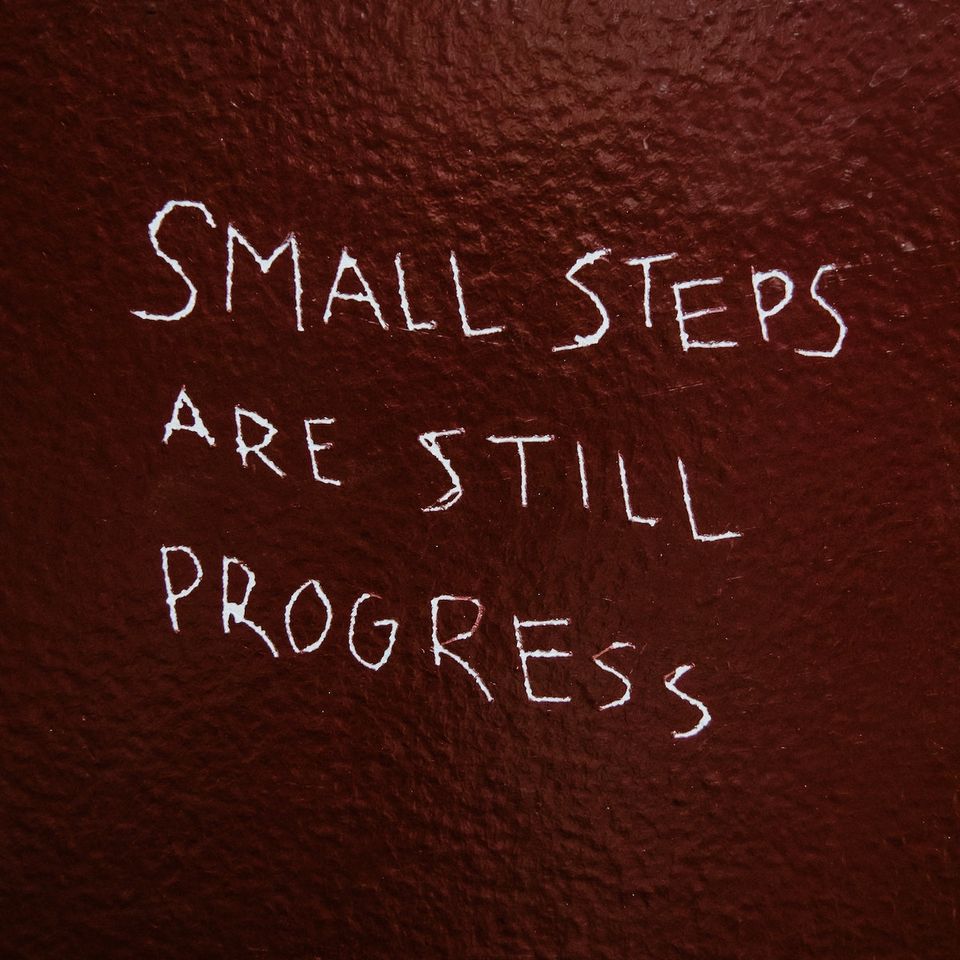Success Is Not the Opposite of Failure — How this Dichotomy Reinforces Self-Doubt and Shame

Success & Failure, Part II — Why we need to remove the word failure from the discourse of success.
The first time you tried to stand on both legs as a baby, you fell down. Was that your first failure in life, or did you simply get up and try again? Did your parents scold you for being bad, lazy, or incompetent? I’m certain they encouraged you. You kept trying until one day you stood on both feet and took your first steps, to the claps, smiles, and adoring praise of your parents.
Success Is Not an End-Destination, It Is a Measure of Progress.
A baby learns how to walk because that’s a function of its nature. It achieves success in walking unassisted through the practice of trying to stand without falling, taking a step without falling, and repeatedly trying again. One day, the baby is standing and walking around as if that’s what it had always done.
For even more insight, listen to today's article on the Think Queerly Podcast:
In, “Your Understanding of the Meaning of Failure Could Be the Reason for Unrealized Goals and Dreams” (Success & Failure, Part I), I stated that,
“Failure relates to something that didn’t work out as planned. Failure is an end-point. Failing is about decline, a defect, or a fault.”
Thus, failure is not a true opposite to success. Rather, failure is a “compliment” to how we understand the process of success, and where we might get emotionally blocked along the way.
You might ask, “How did I get here?”
Along the way — this thing we call life — we measure our progress by reviewing what we’ve accomplished, including what didn’t work out. We measure success as the quality and consistency of our intentions, refinements, and actions as we work towards our desired outcomes.
The cliché, “Success leaves clues” is telling. Success is nothing more than a process of completed actions that accumulate like the run-out sands in an hourglass and manifest as the accomplishment of one’s desired goal.
The negative effects of shame on success (which lead to “feeling” like a failure).
Many years ago, I discovered that shame — in my case, gay shame — was holding me back from accomplishing certain financial goals and limiting my career success. I was afraid of other people’s opinions, reinforced as critical judgement by a mentor who I later realized was a classic bully.
Most of us are concerned about what other people think of us, but to varying degrees. This may show up as trying to please others and win favour, a useful behaviour to avoid and deflect criticism and shame. As a gay man, I struggled with feeling good enough about myself as a person. I didn’t feel like I belonged, or that I was equal within society.
Not feeling good enough and feeling like an outsider, began in childhood. I felt isolated and rejected by my peers, which had a profound effect on my emotional, intellectual, and psychological development. In high school, by trying to fit in and not draw attention to me as a closeted gay man, I had to closet parts of my true self. Gay shame reared its ugly head in my late 30s and early 40s when I realized I was afraid of my success — I was afraid of being visible.
What a paradox! I wanted to be a successful writer and gay personal trainer and to be recognized for my contribution. On the one hand, I wasn’t afraid of being in the public eye. But on the other, those years of adolescent gay shame created a pattern of stress and the constant emotional threat of exposure. That played out as a lack of acceptance and connection. I felt that the more public I was, the more likely I would have some part of my freedom taken away. Getting my needs met around safety caused me to avoid taking successive steps towards my goals and dreams.
If you don’t accomplish a goal, does that make you unsuccessful and a failure?
If you had the goal to walk to the store, but along the way you ran into an old friend and talked for an hour instead, does that mean you failed at your goal? This might seem like a trite example, but it begs the question, why do we use failure to mean something so vile about ourselves?
To be labeled a failure is a judgement, whether you are shamed by others or yourself. This is often called self-sabotage. It’s my view that self-sabotage is a mistake perpetuated in the world of personal development. The reason we make choices that look like we’re sabotaging ourselves is because of a lack of prediction and response in our environment — the lack of feeling safe, connected, and accepted. These are the needs of the mammalian brain, and you can see how feelings of shame would find their home here.
Where there is light, there is also dark.
Just as we can utilize empowering and exciting emotions to help us succeed, the darker side emotions slow us down or put blocks in our path. Fear, worry, and self-doubt may lead to feeling like an imposter. Yet, these emotions can be useful if you understand what fear of success and self-doubt are telling you.
The paradox with feeling like an imposter is to become comfortable with uncertainty. If your goal is a stretch — a big challenge — you might need to first acquire information, develop new skills along the way, or even take a leap of faith. The very thing you want is concurrently causing you to feel uncertain, which causes stress. When we are unsure about any situation in life, we are lacking prediction and response.
If your actions are more stressful than you can handle, it’s human nature to fight, flee, or freeze.
This happens when you have a lack of prediction about your environment and cannot respond in a comfortable and skillful way. Without adequate prediction and response, we get pulled out of our logical brain (the pre-frontal cortex) into our social, mammalian brain (anterior cingulate cortex), or into our reptilian brain (the amygdala).
The challenge in this situation is both the quality and quantity of stress. You need to determine if this is the kind of stress that’s motivating — in other words, a challenge that excites you in which you will need to up your game and refine your skills. On the other hand, if there is too much stress around your goal, that will cause you to feel overwhelmed. If you can’t overcome this state, you will move into threat (and out of your logical brain). As long as you don’t perceive the goal as a threat to your physical safety (which might require a fight/flight/freeze response), you are likely to shut down and experience dark-side emotional reactions like demotivation, disinterest, sadness, frustration, shame, and so on.
Less Is More.
Recall what I wrote in, Success & Failure, Part I:
Personal failure is a form of overwhelm in the form of fear or threat. Failure is not a lack of competence. Failure is the decision to give up made while stressed. When this happens, and you can’t see a way forward, your emotional response is to stop acting on your goal and to protect yourself from further stress.
The most effective and seemingly too-simple strategy to deal with overwhelm is to choose smaller, less challenging, less stressful, and less threat-inducing actions. Yup, you don’t need an app for that!
With smaller steps, you can challenge yourself without shutting down by building upon the successes of your past experiences. If you continue taking small but also frequent steps towards your goal, you will build habits, behaviours, and skills that the basal ganglia part of your brain recognizes as patterns (prediction) to create appropriate responses. In other words, if you try to feed the computer (your brain) too much data and too many commands, it will crash. In this case, less is more.
Every step you take in life is progress, regardless of direction.
Forwards and backwards are simplistic, dualistic descriptions for movement in space and should not be used to further confuse the natural and progressive process of life.
No one can go backwards in life. You can’t go backwards on your goals and dreams. That’s like saying you are going back in time, which is impossible. We exist at this moment — now. We measure what we have accomplished in what we call the past. And we anticipate what we hope to achieve by planning actions for the future.
Life Is a Successive Series of Steps.
That line is my favourite refinement of the meaning of success. The definition of "successive" includes: in a row, sequential, consecutive, and following. That is all that success really is, a series of steps or actions, each one following the next. Success is the process, whereas successful is the completion of the steps.
What makes the idea of success meaningful regarding our goals and dreams, is how we feel along the way. How you act with focus and emotional intention influences the quality and potency of the steps you take towards what you want to accomplish. If you lead with a powerful emotional intention for what you desire, each step will feel natural, compelling, and even successful.
Failure and Success Are Not a Duality.
Success as a measurement is a process of acting towards an intended outcome, but failure is a moment.
Failure is not a process. If we highlight the definition of failure in the realm of accomplishing goals, then failure is the “nonperformance of something due.” But even that is debatable, since you may have successfully accomplished many steps along the way before choosing to no longer act on the completion of your objective.
Success is a process. Success requires many mis-takes along the path to solving a problem. Mistakes, as well as missed-takes, are part of the process in the pursuit of realizing your goals.
In other words, if you don’t succeed at a goal, that doesn’t make you a failure. Success and failure are not in opposition to each other. If you recognize that truth, you will be far more successful in life.





Member discussion